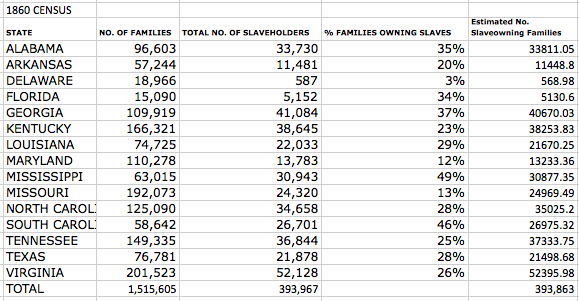There is some truth to the claims, but the numbers are extremely prima facie distorted. Especially since they are (apparently) given in terms of "households", with no immediately obvious method by which such figures were fitted to a preconception "estimated" calculated[Note 1]. Even if his numbers are accurate however, they do not necessarily reflect the true picture[Note 2] and should only be taken with a very large grain of salt.
Full disclosure: I have not opened that youtube link, and have no intention of doing so. Please fill me in if I'm misrepresenting his position.
In terms of actual persons, on the eve of the Civil War, the census showed 393,967 slave owners in the United States.
It would also be interesting to know just what portion fo the Southern population actually composed the so-called "slavocracy." Unfortunately, the official United States census did not include "slaveholder" as a data category until 1860 ...
The census showed 12,240,293 of the country's total 1860 population of 31,183,582 lived in slaveholding states. The total number of actual slaveholders was only 393,967. This represents just 3.2 percent of the total Southern population and just 1.26 percent of the nation's population.
- Julius, Kevin C. The Abolitionist Decade, 1829-1838: A Year-by-year History of Early Events in the Antislavery Movement. McFarland, 2004.
In contrast, approximately 25% of all Jewish southerners owned slaves.
A few Jews even became prominent slaveowning planters in the Old South ... as successful as these Jewish Southerners were by Southern standards, they represent a very tiny percentage of the 20,000 Jews residing in the antebellum South who could, or would, ever aspire to own a slave. About 5,000 Jews owned one or more slaves - about 1.25 percent of all the slaveowners in the antebellum South.
- Rodriguez, Junius. The Historical Encyclopedia of World Slavery, Volume 1, ABC-CLIO, 1997
The last figure is in broad agreement with the previous source - 1.25% of 393,967 total slave owners would equate to 4925 Jewish slave owners.
So there is some essence of truth to (what I presume to be) the main point here, which is that Jewish southerners were more likely to own slaves (25% vs 3.2% 4.9% [See below] of census persons). The veracity of his actual figures (e.g. "40% of household") is a completely different matter altogether.
Note 1:
As far as I can tell, he multiplied the number of slave owners by 1.6 to get the number of slave owning households. Thus 25% of Southern Jews became "40%" of Jewish households owning slaves. Meanwhile, 1.26% of the total American population becomes 2% of all white households.
Of course, the error is that 25% was the number of Jewish southerners, while 1.26% was the entire population of the United States. In fact, the number of whites living in the slave states were only 8,039,000. Those 393,967 slave holders would actually represent 4.9% of that population (thanks to @UriZarfaty for pointing this out). Applying the formula, that becomes 7.84% - nearly four times as many as claimed.
Therefore, without even going into the soundness (or lack thereof) of his calculations, it is obvious these figures are bogus in error.
Note 2:
Regardless of factual accuracy, such numbers are almost completely meaningless, because they do not account for any other difference in demographics besides religion. For example, poorer people were less likely to own slaves than wealthier families. How did the population of southern Jews compare to whites in this regard?
It could well be the case that if we normalise for all other factors, we will find no statistically significant difference between Jews and the overall population in terms of slave ownership. Without accounting for all factors, this becomes a case of (as @TomAu pointed out) comparing apples and oranges.
For those Jews who did own slaves, the records demonstrate that they were not significantly different from other masters in their treatments of their bondsmen.
- Rodriguez, Junius. The Historical Encyclopedia of World Slavery, Volume 1, ABC-CLIO, 1997
In all honesty I'm inclined to think his numbers were manipulated chosen specifically to inflate Jewish participation in slavery.
